China Brands, Marketing & Consumers
Chinese Fashion First: Consumer Nationalism and ‘China Chic’
Consumer sentiments on Western brands and made-in-China fashion are changing.
Published
4 years agoon
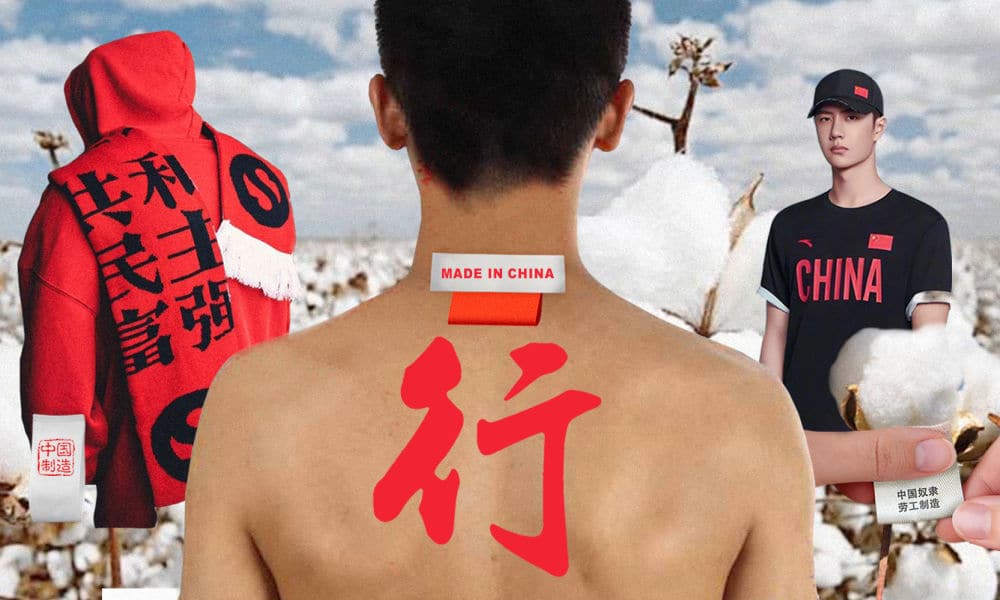
WHAT’S ON WEIBO ARCHIVE | PREMIUM CONTENT ARTICLE
At a time when Chinese media, celebrities, and consumers are condemning and boycotting Western brands, Chinese fashion and luxury brands are flourishing in a new era of “proudly made in China.”
This is the “WE…WEI…WHAT?” column by Manya Koetse, original publication in German by Goethe Institut China, see Goethe.de: WE…WEI…WHAT? Manya Koetse erklärt das chinesische Internet.
“The first thing Chinese fashion magazines should do is support the Chinese fashion industry, Chinese domestic brands, and Chinese designers!” In a video that went viral on social media, Hung Huang (洪晃), the famous American-Chinese television host and publisher of fashion magazine iLook, called out for a healthy development of China’s fashion industry that does not rely on Western brands to continue growing.
Hung Huang’s remarks were made in late March of 2021, around the time when a social media storm broke out in China over the Better Cotton Initiative (BCI) and its brand members – including H&M, Nike, and Adidas – for no longer sourcing cotton from China’s Xinjiang region. This boycott generated a huge backlash in mainland China. The online anger was mainly directed at H&M, since the Swedish retailer is a top member of the BCI and had previously released a statement on its site in which the company said it was “deeply concerned” over reports of alleged forced labor in the production of cotton in Xinjiang.
The news developments were followed by a wave of social media boycott campaigns and Chinese brand ambassadors cutting ties with international brands. It also ignited a social media movement in support of domestic brands, ‘made in China,’ and Xinjiang as China’s largest cotton-growing area.
The hashtag “I support Xinjiang cotton” (#我支持新疆棉花#) received a staggering 7.9 billion views on Weibo within a few weeks time. Simultaneously, a rising confidence in national brands became increasingly visible on social media, where the calls for supporting domestic brands are growing louder.
A recent survey by state media outlet Global Times suggests that most Chinese consumers believe that Western brands could be replaced by Chinese ones. The article claims that 75 percent of its survey respondents agree that “national products could fully or partially replace Western products.”
Proudly Made in China
Recent years have not just seen a rise in Chinese fashion brands, but also the emergence of a fashion scene where traditional Chinese elements play a major role. The Hanfu movement, for example, seeks to revitalize the wearing of Han Chinese ethnic clothing. But beyond that, brands are also weaving more Chinese themes into everyday fashion items such as sneakers and t-shirts.
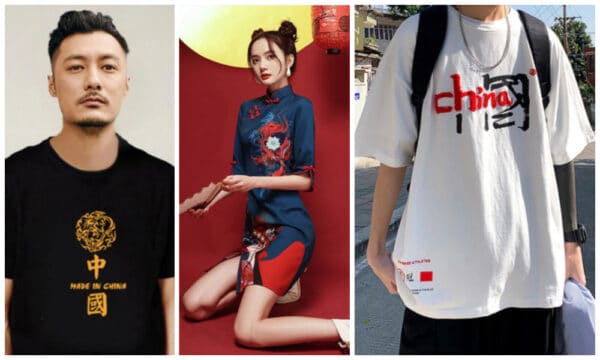
China themed fashion on e-commerce platform Taobao.
The rise in popularity of Chinese fashion brands and styles was dubbed the “China Chic” trend by CGTN in 2020. “China Chic” is a translation of “guócháo” (国潮), which literally means “national tide,” referring to the rise of domestic brands, with their designs often incorporating culturally Chinese elements into the latest trends. In 2021, for the first time ever, the Spring Festival Gala (Chinese state media’s biggest live televised event) also included a fashion show to show the beauty of Chinese costumes to “demonstrate cultural confidence.”
With celebrity endorsements being one of the most important strategies for social media marketing, Chinese celebrities play a crucial role in this trend as guócháo ambassadors. Chinese actor and singer Xiao Zhan (肖战) was praised on social media for becoming the new brand ambassador of the Chinese sportswear brand Lining. When celebrity Wang Yibo became the spokesperson for the domestic brand Anta Sports, one Weibo hashtag page on the topic received over one billion views (#王一博代言安踏#) in late April of 2021. The promotional poster featuring Wang Yibo shows him wearing a t-shirt with “China” on it, including the national flag – profiling Anta as a nation-loving brand.
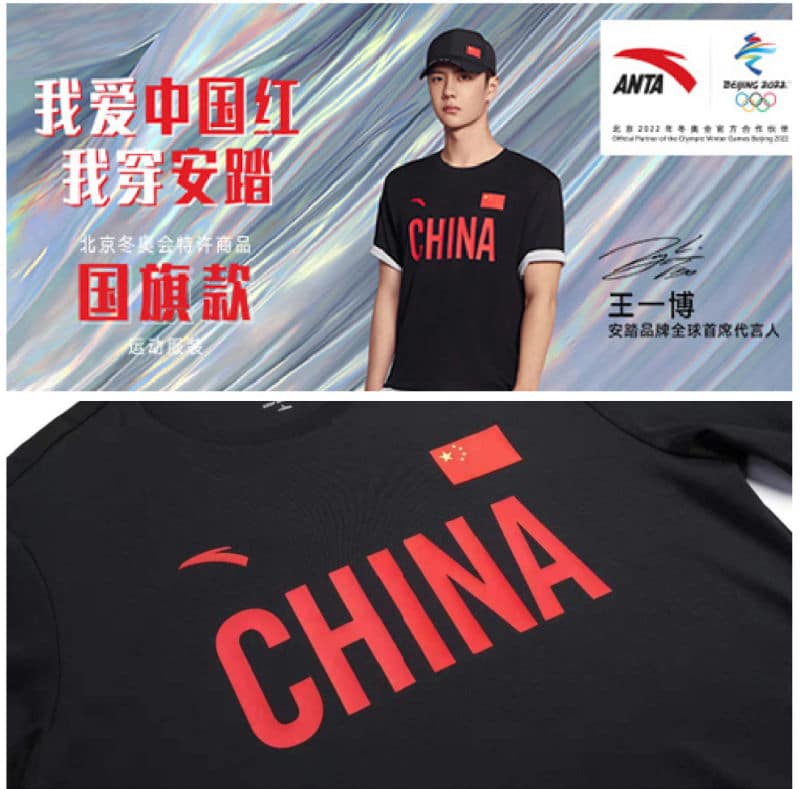
The rising popularity of ‘made in China’ fashion is noteworthy in a consumer culture where Western brands are often viewed as being of higher quality than domestically produced fashion. The very fact that these foreign brands succeeded in gaining access to China’s market is, in the eyes of many consumers, a reason to believe they must be of higher quality.[1] Those sentiments now seem to be shifting.
A recent Chinese short documentary produced by Tmall titled “Proudly Made in China” (爆款中国) discusses how Western brands have dominated the Chinese fashion and luxury market for years, making it more difficult for Chinese brands to become big players in their own field.
“Why are Chinese brands not as highly accepted by Chinese consumers?”, asks Li Jiaqi (李佳琦), an influencer and new brand recruiter for Tmall who is featured in the short film: “Why do Chinese consumers seem to have a preconceived and biased view that Chinese products are of poor quality?”
In the short film, Li explains that Chinese consumers have since long had worries about buying Chinese brands, and that one slight problem with a product will automatically negatively reflect on the entire brand.
Existing consumer preferences for Western brands have even created the idea that Chinese brands should register abroad and pose as a foreign brand to enlarge their chances to succeed in the Chinese market.
China’s flourishing live-streaming market and domestic e-commerce platforms have provided new opportunities for Chinese brands to shine once their products gain consumer recognition. Especially younger consumers, those born after 1995 or 2000, show more confidence in Chinese brands than the generations before them.
In the “Proudly Made in China” film, this growing trust in domestic brands among Chinese younger generations is linked to a striking confidence and pride in China, its national identity, and its culture. On Weibo, some commenters replied: “This is the era of domestic brands!”
Western Brand Controversies
Although the influence of national pride on China’s young consumers might already have been strong before, there are also changing dynamics in the relation between Chinese consumers and Western brands which seem to have boosted the ‘guócháo’ and domestic brand trend; Chinese brands have been cast in a more positive light over the past few years due to the controversies involving Western brands.
In 2018, Italian fashion house Dolce & Gabbana (D&G) faced consumer outrage in China for publishing a culturally insensitive advertising campaign that showed a Chinese model clumsily using chopsticks to eat Italian dishes such as pizza, cannoli, and spaghetti. The campaign, which was titled “D&G Loves China,” completely backfired with many finding it racist and sexist and vowing to boycott the brand. The controversy became so big that a big D&G fashion show in Shanghai was canceled and the company saw a slump in its business on the mainland.

Still from the promotional D&G video that was deemed racist in China, causing major controversy in 2018 (whatsonweibo).
In 2019, many different international fashion brands, including Versace, Coach, Calvin Klein, Givenchy, and ASICS, were condemned by Chinese netizens for listing Hong Kong, Macau, and Taiwan as separate countries or regions – not part of China – on their official websites or brand T-shirts. Chinese celebrities cut their collaborations with many of these brands.
When in 2020 the aforementioned Better Cotton Initiative (BCI) announced that it was ceasing all operations in northwest China’s Xinjiang Uygur Autonomous Region amid accusations of “forced labor” there, backlash in China further grew against the organization and the brands affiliated to it. As reported by CGTN, BCI has recently removed its statement on Xinjiang cotton from its website (allegedly this was related to a cyber attack), but the discussions on the position of Western brands in China continue, with both state media and netizens sending out the message that “foreign companies that slander China” are not welcome in the country.
The Future of Fashion Brands in China
“Boycott Nike? Support domestic brands? What are we supposed to do now?” It is a question posed by the Chinese ‘Sneakersbar’ vlogger Fang (@鞋吧Sneakersbar), a sportswear-focused self-media account with over 3,5 million followers on Weibo. The question resonates with many consumers, who are caught between politics, patriotism, and personal preferences for certain brands.
In their latest video, Sneakersbar makes up the balance on where Western brands, especially those affiliated with BCI, stand in the Chinese market today. On the one hand, Fang argues, many foreign brands, including Adidas, Nike, H&M, Uniqlo, and others, have already become part of China’s commercial fashion landscape and many consumers love these brands and their products. On the other hand, these foreign brands are also making political choices that Chinese consumers cannot ignore. But does this mean they should be boycotted forever? Does it mean that you should look down on others buying these products?
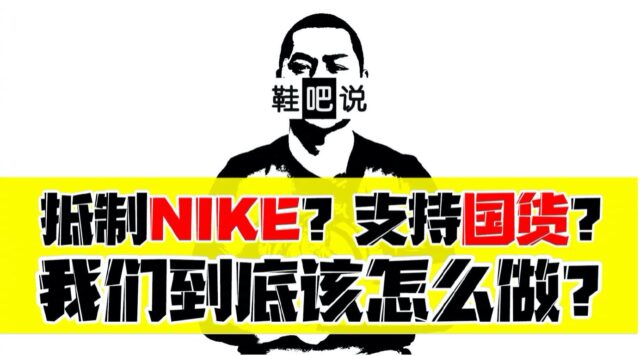
The video by popular weibo account Sneakersbar: “Boycott Nike? Support Domestic Brands? What are we supposed to do?”
The answer is that consumers should stay rational in their choices, Fang argues. This means that choosing Chinese brands out of a form of “rational patriotism” is fine, but people should not attack others merely because they wear foreign brands or work in their shops. The same goes for those consumers who only want to buy foreign brands just because they are foreign; they could also consider Chinese products to support domestic brands – especially those brands which refrain from copying foreign ones and have developed their own unique designs and styles.
Many commenters on Weibo support Fang’s message of “reasonable patriotism without blind worship” (“理性爱国,也不盲目崇拜”), supporting the idea that Western and Chinese brands can co-exist and that they can be competitors in a market where Chinese fashion labels are getting more room to grow.
“Nationalism and patriotism offer opportunities for Chinese brands,” one Weibo user writes: “China Chic and China fashion trends are putting more pressure on foreign brands. Because of the speedy rise of Chinese domestic brands, which are producing high-quality products and are applying smart marketing methods, more and more patriotic young people are buying their products.”
It is clear that many consumers in China support domestic brands and hope that Chinese fashion can flourish within its own market. But there are also those voices stressing the importance of consumers’ freedom to buy the brands that suit them, wherever they are from and regardless of politics. One person commented: “Western or Chinese brand, I just want to wear the shoes that are most comfortable for me to walk in.”
By Manya Koetse
Follow @whatsonweibo
[1] Tian, Kelly and Lily Dong. 2011. Consumer-Citizens of China: The Role of Foreign Brands in the Imagined Future of China. London & New York: Routledge. Page 7.
This text was written for Goethe-Institut China under a CC-BY-NC-ND-4.0-DE license (Creative Commons) as part of a monthly column in collaboration with What’s On Weibo.
Spotted a mistake or want to add something? Please let us know in comments below or email us. First-time commenters, please be patient – we will have to manually approve your comment before it appears.
Manya is the founder and editor-in-chief of What's on Weibo, offering independent analysis of social trends, online media, and digital culture in China for over a decade. Subscribe to gain access to content, including the Weibo Watch newsletter, which provides deeper insights into the China trends that matter. More about Manya at manyakoetse.com or follow on X.

You may like
China Arts & Entertainment
Controversial Wanghong Livestreamers Are Becoming a Weibo Staple in China
‘Wanghong’ was a mark of online fame; now, it’s increasingly tied to controversy and scandal.
Published
6 months agoon
October 27, 2024
As livestreaming continues to gain popularity in China, so do the controversies surrounding the industry. Negative headlines involving high-profile livestreamers, as well as aspiring influencers hoping to make it big, frequently dominate Weibo’s trending topics.
These headlines usually revolve around China’s so-called wǎnghóng (网红) influencers. Wanghong is a shortened form of the phrase “internet celebrity” (wǎngluò hóngrén 网络红人). The term doesn’t just refer to internet personalities but also captures the viral nature of their influence—describing content or trends that gain rapid online attention and spread widely across social media.
Recently, an incident sparked debate over China’s wanghong livestreamers, focusing on Xiaohuxing (@小虎行), a streamer with around 60,000 followers on Douyin, who primarily posts evaluations of civil aviation services in China.

Xiaohuxing (@小虎行)
On October 15, 2024, at Shenzhen Bao’an International Airport, Xiaohuxing confronted a volunteer at the automated check-in counter, insisting she remove her mask while livestreaming the entire encounter. He was heard demanding, “What gives you the right to wear a mask? What gives you the right not to take it off?” and even attempted to forcibly remove her mask, challenging her to call the police.

During the livestream, the livestreamer confronted the woman on the right for wearing a facemask.
He also argued with a male traveler who tried to intervene. In the end, the airport’s security officers detained him. Shortly after the incident, a video of the livestream went viral on Weibo under various hashtags (e.g. #网红小虎行机场强迫志愿者摘口罩#) and attracted millions of views. The following day, Xiaohuxing’s Douyin account was banned, and all his videos were removed. The Shenzhen Public Security Bureau later announced that the account’s owner, identified as Wang, had been placed in administrative detention.
On October 13, just days before, another livestreaming controversy erupted at Guangzhou Baiyun International Airport. Malatang (@麻辣烫), a popular Douyin streamer with over a million followers, secretly filmed a young couple kissing and mocked them, continuing to film while passing through security—an area where filming is prohibited.
Her livestream quickly went viral, sparking discussions about unauthorized filming and misconduct among Chinese wanghong. In response, Malatang’s agent posted an apology video. However, the affected couple hired a lawyer and reported the incident to the police (#被百万粉丝网红偷拍当事人发声#). On October 17, Malatang’s Douyin account was banned, and her videos were removed.

Livestreamer Malatang making fun of the couple in the back at the airport.
In both cases, netizens uncovered additional examples of inappropriate behavior by Xiaohuxing and Malatang in past broadcasts. For example, Xiaohuxing was reportedly aggressive towards a flight attendant, demanding she kneel to serve him, while Malatang was criticized for scolding a delivery person who declined to interact with her on camera.
Comments on Weibo included, “They’ll do anything for traffic. Wanghong are getting a bad reputation because of people like this.” Another added, “It seems as if ‘wanghong’ has become a negative term now.”
Rising Scrutiny in China’s Wanghong Economy
Xiaohuxing and Malatang are far from isolated cases. Recently, many other wanghong livestreamers have also been caught up in negative news.
One such figure is Dong Yuhui (董宇辉), a former English teacher at New Oriental (新东方) who transitioned to livestreaming for East Buy (东方甄选), where he mixed education with e-commerce (read here). Dong gained significant popularity and boosted East Buy’s brand before leaving to start his own company. Recently, however, Dong faced backlash for inaccurate statements about Marie Curie during an October 9 livestream. He incorrectly claimed that Curie discovered uranium, invented the X-ray machine, and won the Nobel Prize in Literature, among other things.
Considering his public image as a knowledgeable “teacher” livestreamer, this incident sparked skepticism among viewers about his actual expertise. A related hashtag (#董宇辉称居里夫人获得诺贝尔文学奖#) garnered over 81 million views on Weibo. In addition to this criticism, Dong is also being questioned about potential false advertising, which is a major challenge for all livestreamers selling products during their streams.
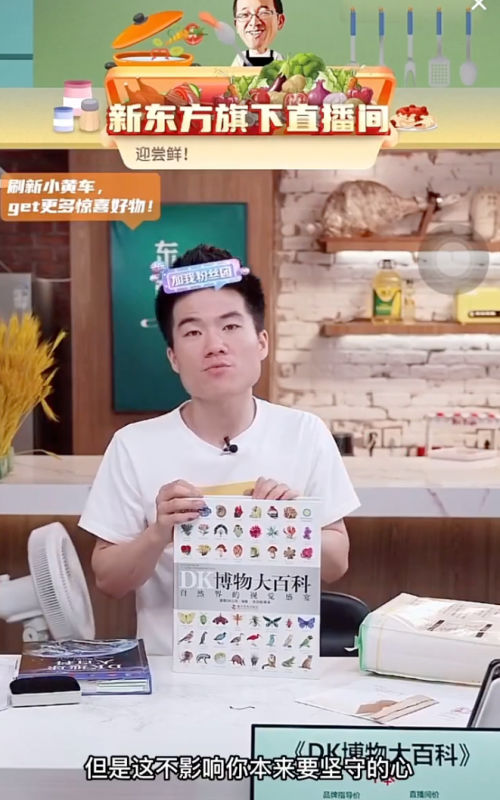
Dong Yuhui (董宇辉) during one of his livestreams.
Another popular livestreamer, Dongbei Yujie (@东北雨姐), is currently also facing criticism over product quality and false advertising claims. Originally from Northeast China, Dongbei Yujie shares content focused on rural life in the region. Recently, her Douyin account, which boasts an impressive 22 million followers, was muted due to concerns over the quality of products she promoted, such as sweet potato noodles (which reportedly contained no sweet potato). Despite issuing public apologies—which have garnered over 160 million views under the hashtag “Dongbei Yujie Apologizes” (#东北雨姐道歉#)—the controversy has impacted her account and led to a penalty of 1.65 million yuan (approximately 231,900 USD).

From Dongbei Yujie’s apology video
Former top Douyin livestreamer Fengkuang Xiaoyangge (@疯狂小杨哥) is also facing a career downturn. Leading up to the 2024 Mid-Autumn Festival, he promoted Hong Kong Meicheng mooncakes in his livestreams, branding them as a high-end Hong Kong product. However, it was soon revealed that these mooncakes had no retail presence in Hong Kong and were primarily produced in Guangzhou and Foshan, sparking accusations of deceptive marketing. Due to this incident and previous cases of misleading advertising, his company came under investigation and was penalized. In just a few weeks, Fengkuang Xiaoyangge lost over 8.5 million followers (#小杨哥掉粉超850万#).

Fengkuang Xiaoyangge (@疯狂小杨哥) and the mooncake controversy.
It’s not only ecommerce livestreamers who are getting caught up in scandal. Recently, the influencer “Xiaoxiao Nuli Shenghuo” (@小小努力生活) and her mother were arrested for fabricating a tragic story – including abandonment, adoption, and hardships – to gain sympathy from over one million followers and earn money through donations and sales. They, and two others who helped them manage their account, were sentenced to ten days in prison for ‘false advertising.’
Wanghong Fame: Opportunity and Risk
China’s so-called ‘wanghong economy’ has surged in recent years, with countless content creators emerging across platforms like Douyin, Kuaishou, and Taobao Live. These platforms have transformed interactions between content creators and viewers and changed how products are marketed and sold.
For many aspiring influencers, becoming a livestreamer is the first step to building a presence in the streaming world. It serves as a gateway to attracting traffic and potentially monetizing their online influence.
However, before achieving widespread fame, some livestreamers resort to using outrageous or even offensive content to capture attention, even if it leads to criticism. For example, before his account was banned, Xiaohuxing set his comment section to allow only followers to comment, gaining 3,000 new followers after his controversial livestream at Shenzhen Airport went viral. Many speculated that some followers joined just to leave critical comments, but it nonetheless grew his following.
As livestreamers gain significant fame, they must exercise greater caution, as they often hold substantial influence over their audiences, making accuracy essential. Mistakes, whether intentional or not, can quickly erode trust, as seen in the example of the super popular Dong Yuhui, who faced backlash after his inaccurate comment about Marie Curie sparked public criticism.
China’s top makeup livestreamer, Li Jiaqi (李佳琦), experienced a similar reputational crisis in September last year. Responding dismissively to a viewer who commented on the high price of an eyebrow pencil, Li replied, “Have you received a raise after all these years? Have you worked hard enough?” Commentators pointed out that the pencil’s cost per gram was double that of gold at the time. Accused of “forgetting his roots” as a former humble salesman, Li lost one million Weibo followers in a day (read more here).
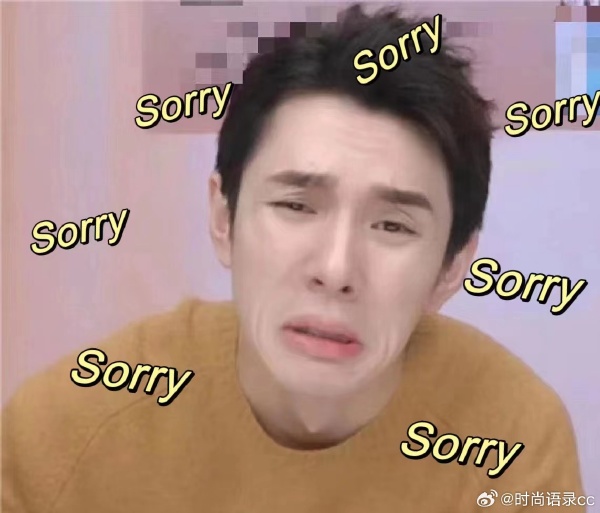
This meme shows that many viewers did not feel moved by Li’s apologetic tears after the eyepencil incident.
Despite the challenges and risks, becoming a wanghong remains an attractive career path for many. A mid-2023 Weibo survey on “Contemporary Employment Trends” showed that 61.6% of nearly 10,000 recent graduates were open to emerging professions like livestreaming, while 38.4% preferred more traditional career paths.
Taming the Wanghong Economy
In response to the increasing number of controversies and scandals brought by some wanghong livestreamers, Chinese authorities are implementing stricter regulations to monitor the livestreaming industry.
In 2021, China’s Propaganda Department and other authorities began emphasizing the societal influence of online influencers as role models. That year, the China Association of Performing Arts introduced the “Management Measures for the Warning and Return of Online Hosts” (网络主播警示与复出管理办法), which makes it challenging, if not impossible, for “canceled” celebrities to stage a comeback as livestreamers (read more).
The Regulation on the Implementation of the Law of the People’s Republic of China on the Protection of Consumer Rights and Interests (中华人民共和国消费者权益保护法实施条例), effective July 1, 2024, imposes stricter rules on livestream sales. It requires livestreams to disclose both the promoter and the product owner and mandates platforms to protect consumer rights. In cases of illegal activity, the platform, livestreaming room, and host are all held accountable. Violations may result in warnings, confiscation of illegal earnings, fines, business suspensions, or even the revocation of business licenses.
These regulations have created a more controlled “wanghong” economy, a marked shift from the earlier, more unregulated era of livestreaming. While some view these measures as restrictive, many commenters support the tighter oversight.
A well-known Kuaishou influencer, who collaborates with a person with dwarfism, recently faced backlash for sharing “vulgar content,” including videos where he kicks his collaborator (see video) or stages sensational scenes just for attention.
Most commenters welcome the recent wave of criticism and actions taken against such influencers, including Xiaohuxing and Dongbei Yujie, for their behavior. “It’s easy to become famous and make money like this,” commenters noted, adding, “It’s good to see the industry getting cleaned up.”
State media outlet People’s Daily echoed this sentiment in an October 21 commentary, stating, “No matter how many fans you have or how high your traffic is, legal lines must not be crossed. Those who cross the red line will ultimately pay the price.”
This article and recent incidents have sparked more online discussions about the kind of influencers needed in the livestreaming era. Many suggest that, beyond adhering to legal boundaries, celebrity livestreamers should demonstrate a higher moral standard and responsibility within this digital landscape. “We need positive energy, we need people who are authentic,” one Weibo user wrote.
Others, however, believe misbehaving “wanghong” livestreamers naturally face consequences: “They rise fast, but their popularity fades just as quickly.”
When asked, “What kind of influencers do we need?” one commenter responded, “We don’t need influencers at all.”
By Wendy Huang
Follow @whatsonweibo
Edited for clarity by Manya Koetse
Spotted a mistake or want to add something? Please let us know in comments below or email us. Please note that your comment below will need to be manually approved if you’re a first-time poster here.
©2024 Whatsonweibo. All rights reserved. Do not reproduce our content without permission – you can contact us at info@whatsonweibo.com
China Books & Literature
Why Chinese Publishers Are Boycotting the 618 Shopping Festival
Bookworms love to get a good deal on books, but when the deals are too good, it can actually harm the publishing industry.
Published
11 months agoon
June 8, 2024By
Ruixin Zhang
JD.com’s 618 shopping festival is driving down book prices to such an extent that it has prompted a boycott by Chinese publishers, who are concerned about the financial sustainability of their industry.
When June begins, promotional campaigns for China’s 618 Online Shopping Festival suddenly appear everywhere—it’s hard to ignore.
The 618 Festival is a product of China’s booming e-commerce culture. Taking place annually on June 18th, it is China’s largest mid-year shopping carnival. While Alibaba’s “Singles’ Day” shopping festival has been taking place on November 11th since 2009, the 618 Festival was launched by another Chinese e-commerce giant, JD.com (京东), to celebrate the company’s anniversary, boost its sales, and increase its brand value.
By now, other e-commerce platforms such as Taobao and Pinduoduo have joined the 618 Festival, and it has turned into another major nationwide shopping spree event.
For many book lovers in China, 618 has become the perfect opportunity to stock up on books. In previous years, e-commerce platforms like JD.com and Dangdang (当当) would roll out tempting offers during the festival, such as “300 RMB ($41) off for every 500 RMB ($69) spent” or “50 RMB ($7) off for every 100 RMB ($13.8) spent.”
Starting in May, about a month before 618, the largest bookworm community group on the Douban platform, nicknamed “Buying Like Landsliding, Reading Like Silk Spinning” (买书如山倒,看书如抽丝), would start buzzing with activity, discussing book sales, comparing shopping lists, or sharing views about different issues.

Social media users share lists of which books to buy during the 618 shopping festivities.
This year, however, the mood within the group was different. Many members posted that before the 618 season began, books from various publishers were suddenly taken down from e-commerce platforms, disappearing from their online shopping carts. This unusual occurrence sparked discussions among book lovers, with speculations arising about a potential conflict between Chinese publishers and e-commerce platforms.
A joint statement posted in May provided clarity. According to Chinese media outlet The Paper (@澎湃新闻), eight publishers in Beijing and the Shanghai Publishing and Distribution Association, which represent 46 publishing units in Shanghai, issued a statement indicating they refuse to participate in this year’s 618 promotional campaign as proposed by JD.com.
The collective industry boycott has a clear motivation: during JD’s 618 promotional campaign, which offers all books at steep discounts (e.g., 60-70% off) for eight days, publishers lose money on each book sold. Meanwhile, JD.com continues to profit by forcing publishers to sell books at significantly reduced prices (e.g., 80% off). For many publishers, it is simply not sustainable to sell books at 20% of the original price.
One person who has openly spoken out against JD.com’s practices is Shen Haobo (沈浩波), founder and CEO of Chinese book publisher Motie Group (磨铁集团). Shen shared a post on WeChat Moments on May 31st, stating that Motie has completely stopped shipping to JD.com as it opposes the company’s low-price promotions. Shen said it felt like JD.com is “repeatedly rubbing our faces into the ground.”
Nevertheless, many netizens expressed confusion over the situation. Under the hashtag topic “Multiple Publishers Are Boycotting the 618 Book Promotions” (#多家出版社抵制618图书大促#), people complained about the relatively high cost of physical books.
With a single legitimate copy often costing 50-60 RMB ($7-$8.3), and children’s books often costing much more, many Chinese readers can only afford to buy books during big sales. They question the justification for these rising prices, as books used to be much more affordable.
Book blogger TaoLangGe (@陶朗歌) argues that for ordinary readers in China, the removal of discounted books is not good news. As consumers, most people are not concerned with the “life and death of the publishing industry” and naturally prefer cheaper books.
However, industry insiders argue that a “price war” on books may not truly benefit buyers in the end, as it is actually driving up the prices as a forced response to the frequent discount promotions by e-commerce platforms.
China News (@中国新闻网) interviewed publisher San Shi (三石), who noted that people’s expectations of book prices can be easily influenced by promotional activities, leading to a subconscious belief that purchasing books at such low prices is normal. Publishers, therefore, feel compelled to reduce costs and adopt price competition to attract buyers. However, the space for cost reduction in paper and printing is limited.
Eventually, this pressure could affect the quality and layout of books, including their binding, design, and editing. In the long run, if a vicious cycle develops, it would be detrimental to the production and publication of high-quality books, ultimately disappointing book lovers who will struggle to find the books they want, in the format they prefer.
This debate temporarily resolved with JD.com’s compromise. According to The Paper, JD.com has started to abandon its previous strategy of offering extreme discounts across all book categories. Publishers now have a certain degree of autonomy, able to decide the types of books and discount rates for platform promotions.
While most previously delisted books have returned for sale, JD.com’s silence on their official social media channels leaves people worried about the future of China’s publishing industry in an era dominated by e-commerce platforms, especially at a time when online shops and livestreamers keep competing over who has the best book deals, hyping up promotional campaigns like ‘9.9 RMB ($1.4) per book with free shipping’ to ‘1 RMB ($0.15) books.’
This year’s developments surrounding the publishing industry and 618 has led to some discussions that have created more awareness among Chinese consumers about the true price of books. “I was planning to bulk buy books this year,” one commenter wrote: “But then I looked at my bookshelf and saw that some of last year’s books haven’t even been unwrapped yet.”
Another commenter wrote: “Although I’m just an ordinary reader, I still feel very sad about this situation. It’s reasonable to say that lower prices are good for readers, but what I see is an unfavorable outlook for publishers and the book market. If this continues, no one will want to work in this industry, and for readers who do not like e-books and only prefer physical books, this is definitely not a good thing at all!”
By Ruixin Zhang, edited with further input by Manya Koetse
Independently reporting China trends for over a decade. Like what we do? Support us and get the story behind the hashtag by subscribing:
Spotted a mistake or want to add something? Please let us know in comments below or email us. First-time commenters, please be patient – we will have to manually approve your comment before it appears.
©2024 Whatsonweibo. All rights reserved. Do not reproduce our content without permission – you can contact us at info@whatsonweibo.com.
Subscribe

Chinese New Nickname for Trump Mixes Fairy Tales with Tariff War

China Trending Week 15/16: Gu Ming Viral Collab, Maozi & Meigui Fallout, Datong Post-Engagement Rape Case

China Reacts: 3 Trending Hashtags Shaping the Tariff War Narrative

No Quiet Qingming: From High-Tech Tomb-Sweeping to IShowSpeed & the Seven China Streams

From Trade Crisis to Patriotic Push: Chinese Online Reactions to Trump’s Tariffs

“Dear Li Hua”: The TikTok/Xiaohongshu Honeymoon Explained

Beyond the Box Office: What’s Behind Ne Zha 2’s Success?

IShowSpeed in China: Streaming China’s Stories Well

15 Years of Weibo: The Evolution of China’s Social Media Giant

Tuning Into the Year of the Snake

TikTok Refugees, Xiaohongshu, and the Letters from Li Hua

“Black Myth: Wukong”: From Gaming Screens to the CMG Spring Festival Gala?

US-Russia Rapprochement and “Saint Zelensky”: Chinese Online Reactions to Trump’s Shake-Up

The ‘China-chic Girl’ Image and the Realities of China’s Competitive Food Delivery Market

Collective Grief Over “Big S”
Get in touch
Would you like to become a contributor, or do you have any tips or suggestions? Get in touch here!
Popular Reads
-

 China Insight12 months ago
China Insight12 months agoThe Tragic Story of “Fat Cat”: How a Chinese Gamer’s Suicide Went Viral
-

 China Digital11 months ago
China Digital11 months agoChina’s 2024 Gaokao Triggers Online Discussions on AI
-

 China Arts & Entertainment11 months ago
China Arts & Entertainment11 months agoSinging Competition or Patriotic Fight? Hunan TV’s ‘Singer 2024’ Stirs Nationalistic Sentiments
-

 China Brands, Marketing & Consumers12 months ago
China Brands, Marketing & Consumers12 months agoA Brew of Controversy: Lu Xun and LELECHA’s ‘Smoky’ Oolong Tea




